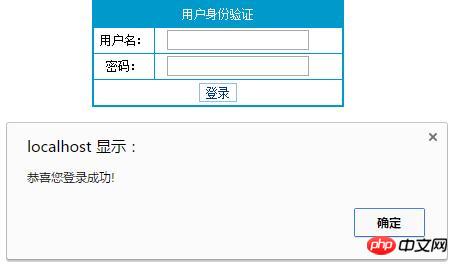PHP 객체지향 사용자 로그인 인증
이 글은 사용자 로그인신원 확인에 대해 주로 객체 지향을 소개합니다. 관심 있는 친구들이 참고할 수 있습니다.
이 글의 예는 모든 사람과 PHP 사용자 로그인 ID를 공유합니다. 구체적인 검증 코드는 참고용입니다.
1. 코드
conn.php
<?php
$conn = new com("adodb.connection");
$connstr="driver={microsoft access driver (*.mdb)}; dbq=". realpath("data/db_database07_188.mdb");
$conn->open($connstr);
?>index.php
<!DOCTYPE html PUBLIC "-//W3C//DTD XHTML 1.0 Transitional//EN" "http://www.w3.org/TR/xhtml1/DTD/xhtml1-transitional.dtd">
<html xmlns="http://www.w3.org/1999/xhtml">
<head>
<meta http-equiv="Content-Type" content="text/html; charset=gb2312" />
<title>用户身份验证</title>
<link rel="stylesheet" type="text/css" href="css/style.css" rel="external nofollow" >
<style type="text/css">
<!--
.STYLE1 {color: #FFFFFF}
-->
</style>
</head>
<body>
<table width="250" border="0" align="center" cellpadding="1" cellspacing="0">
<tr>
<td height="75" bgcolor="#0099CC"><table width="250" height="75" border="0" cellpadding="0" cellspacing="1">
<form name="form1" method="post" action="index.php">
<tr>
<td height="25" colspan="2" bgcolor="#0099CC"><p align="center" class="STYLE1">用户身份验证</p></td>
</tr>
<tr>
<td width="60" height="25" bgcolor="#FFFFFF"><p align="center">用户名:</p></td>
<td width="187" bgcolor="#FFFFFF"><p align="left"> <input type="text" name="username" size="22" class="inputcss"></p></td>
</tr>
<tr>
<td height="25" bgcolor="#FFFFFF"><p align="center">密码:</p></td>
<td height="25" bgcolor="#FFFFFF"><p align="left"> <input type="password" name="userpwd" size="22" class="inputcss"></p></td>
</tr>
<tr>
<td height="25" colspan="2" bgcolor="#FFFFFF"><p align="center"><input name="submit" type="submit" value="登录" class="buttoncss"></p></td>
</tr>
</form>
</table></td>
</tr>
</table>
<?php
if($_POST[submit]!="")
{
$username=$_POST[username]; //接收提交的用户名
$userpwd=$_POST[userpwd]; //接收提交的密码
if(trim($username)==""||trim($userpwd)=="")
{
echo "<script>alert('请输入用户名或用户密码!');history.back();</script>";
exit;
}
class chk //定义密码验证类
{
private $name; //定义用户名属性
private $pwd; //定义密码属性
public function construct($x,$y) //构造函数,对类的属性初始化
{
$this->name=$x;
$this->pwd=$y;
}
public function chkuser() //验证用户身份
{
include_once("conn.php");
$rs=new com("adodb.recordset"); //创建记录集对象
$rs->open("select * from tb_user where username='".$this->name."' and userpwd='".$this->pwd."'",$conn,3,1);
if($rs->eof || $rs->bof)
{
echo "<script>alert('对不起,密码或用户名错误!');history.back();</script>";
exit;
}
else
{
echo "<script>alert('恭喜您登录成功!');history.back();</script>";
exit;
}
}
}
$chk1=new chk($username,$userpwd); //对密码验证类进行实例化
$chk1->chkuser(); //调用chkuser()方法验证用户身份
}
?>
</body>
</html>2. 실행 결과

입니다. 이 기사의 모든 내용은 모든 사람의 학습에 도움이 되기를 바라며, 또한 모든 사람이 Script Home을 지원하기를 바랍니다.
위 내용은 PHP 객체지향 사용자 로그인 인증의 상세 내용입니다. 자세한 내용은 PHP 중국어 웹사이트의 기타 관련 기사를 참조하세요!

핫 AI 도구

Undresser.AI Undress
사실적인 누드 사진을 만들기 위한 AI 기반 앱

AI Clothes Remover
사진에서 옷을 제거하는 온라인 AI 도구입니다.

Undress AI Tool
무료로 이미지를 벗다

Clothoff.io
AI 옷 제거제

AI Hentai Generator
AI Hentai를 무료로 생성하십시오.

인기 기사

뜨거운 도구

메모장++7.3.1
사용하기 쉬운 무료 코드 편집기

SublimeText3 중국어 버전
중국어 버전, 사용하기 매우 쉽습니다.

스튜디오 13.0.1 보내기
강력한 PHP 통합 개발 환경

드림위버 CS6
시각적 웹 개발 도구

SublimeText3 Mac 버전
신 수준의 코드 편집 소프트웨어(SublimeText3)

뜨거운 주제
 7503
7503
 15
15
 1377
1377
 52
52
 78
78
 11
11
 52
52
 19
19
 19
19
 54
54
 Ubuntu 및 Debian용 PHP 8.4 설치 및 업그레이드 가이드
Dec 24, 2024 pm 04:42 PM
Ubuntu 및 Debian용 PHP 8.4 설치 및 업그레이드 가이드
Dec 24, 2024 pm 04:42 PM
PHP 8.4는 상당한 양의 기능 중단 및 제거를 통해 몇 가지 새로운 기능, 보안 개선 및 성능 개선을 제공합니다. 이 가이드에서는 Ubuntu, Debian 또는 해당 파생 제품에서 PHP 8.4를 설치하거나 PHP 8.4로 업그레이드하는 방법을 설명합니다.
 CakePHP 토론
Sep 10, 2024 pm 05:28 PM
CakePHP 토론
Sep 10, 2024 pm 05:28 PM
CakePHP는 PHP용 오픈 소스 프레임워크입니다. 이는 애플리케이션을 훨씬 쉽게 개발, 배포 및 유지 관리할 수 있도록 하기 위한 것입니다. CakePHP는 강력하고 이해하기 쉬운 MVC와 유사한 아키텍처를 기반으로 합니다. 모델, 뷰 및 컨트롤러 gu
 PHP 개발을 위해 Visual Studio Code(VS Code)를 설정하는 방법
Dec 20, 2024 am 11:31 AM
PHP 개발을 위해 Visual Studio Code(VS Code)를 설정하는 방법
Dec 20, 2024 am 11:31 AM
VS Code라고도 알려진 Visual Studio Code는 모든 주요 운영 체제에서 사용할 수 있는 무료 소스 코드 편집기 또는 통합 개발 환경(IDE)입니다. 다양한 프로그래밍 언어에 대한 대규모 확장 모음을 통해 VS Code는
 PHP에서 HTML/XML을 어떻게 구문 분석하고 처리합니까?
Feb 07, 2025 am 11:57 AM
PHP에서 HTML/XML을 어떻게 구문 분석하고 처리합니까?
Feb 07, 2025 am 11:57 AM
이 튜토리얼은 PHP를 사용하여 XML 문서를 효율적으로 처리하는 방법을 보여줍니다. XML (Extensible Markup Language)은 인간의 가독성과 기계 구문 분석을 위해 설계된 다목적 텍스트 기반 마크 업 언어입니다. 일반적으로 데이터 저장 AN에 사용됩니다
 CakePHP 빠른 가이드
Sep 10, 2024 pm 05:27 PM
CakePHP 빠른 가이드
Sep 10, 2024 pm 05:27 PM
CakePHP는 오픈 소스 MVC 프레임워크입니다. 이를 통해 애플리케이션 개발, 배포 및 유지 관리가 훨씬 쉬워집니다. CakePHP에는 가장 일반적인 작업의 과부하를 줄이기 위한 여러 라이브러리가 있습니다.
 문자열로 모음을 계산하는 PHP 프로그램
Feb 07, 2025 pm 12:12 PM
문자열로 모음을 계산하는 PHP 프로그램
Feb 07, 2025 pm 12:12 PM
문자열은 문자, 숫자 및 기호를 포함하여 일련의 문자입니다. 이 튜토리얼은 다른 방법을 사용하여 PHP의 주어진 문자열의 모음 수를 계산하는 방법을 배웁니다. 영어의 모음은 A, E, I, O, U이며 대문자 또는 소문자 일 수 있습니다. 모음이란 무엇입니까? 모음은 특정 발음을 나타내는 알파벳 문자입니다. 대문자와 소문자를 포함하여 영어에는 5 개의 모음이 있습니다. a, e, i, o, u 예 1 입력 : String = "Tutorialspoint" 출력 : 6 설명하다 문자열의 "Tutorialspoint"의 모음은 u, o, i, a, o, i입니다. 총 6 개의 위안이 있습니다
 JWT (JSON Web Tokens) 및 PHP API의 사용 사례를 설명하십시오.
Apr 05, 2025 am 12:04 AM
JWT (JSON Web Tokens) 및 PHP API의 사용 사례를 설명하십시오.
Apr 05, 2025 am 12:04 AM
JWT는 주로 신분증 인증 및 정보 교환을 위해 당사자간에 정보를 안전하게 전송하는 데 사용되는 JSON을 기반으로 한 개방형 표준입니다. 1. JWT는 헤더, 페이로드 및 서명의 세 부분으로 구성됩니다. 2. JWT의 작업 원칙에는 세 가지 단계가 포함됩니다. JWT 생성, JWT 확인 및 Parsing Payload. 3. PHP에서 인증에 JWT를 사용하면 JWT를 생성하고 확인할 수 있으며 사용자 역할 및 권한 정보가 고급 사용에 포함될 수 있습니다. 4. 일반적인 오류에는 서명 검증 실패, 토큰 만료 및 대형 페이로드가 포함됩니다. 디버깅 기술에는 디버깅 도구 및 로깅 사용이 포함됩니다. 5. 성능 최적화 및 모범 사례에는 적절한 시그니처 알고리즘 사용, 타당성 기간 설정 합리적,





